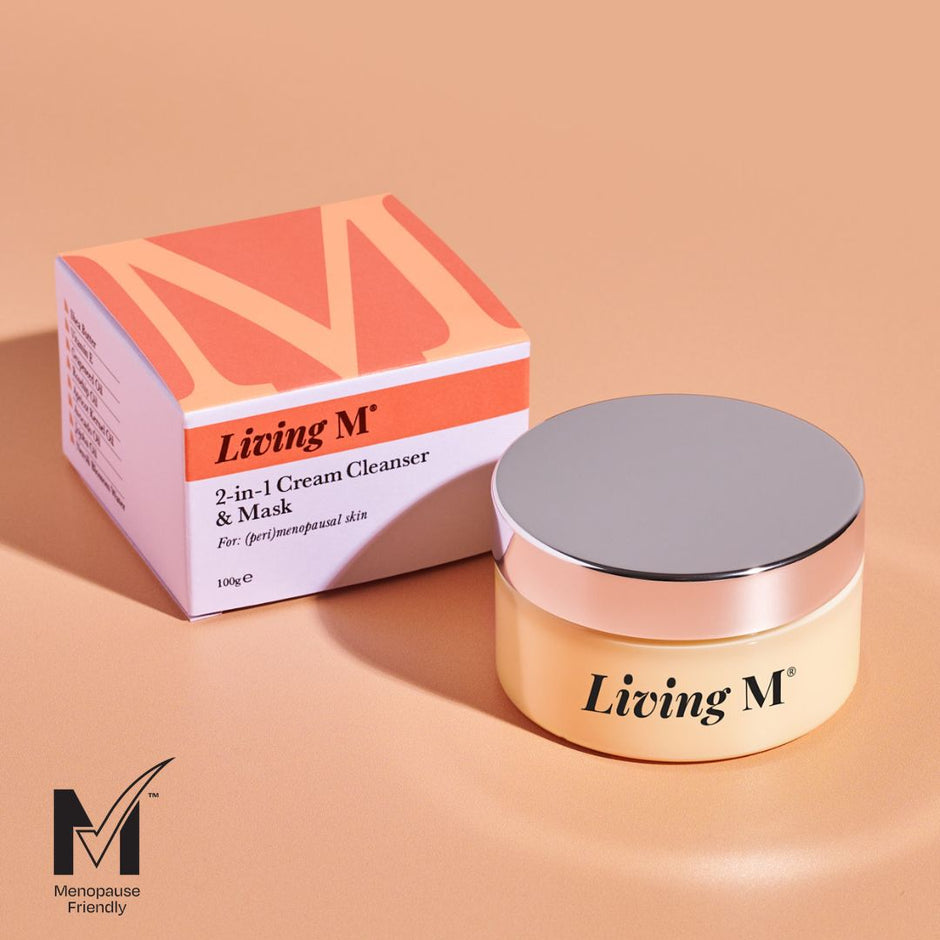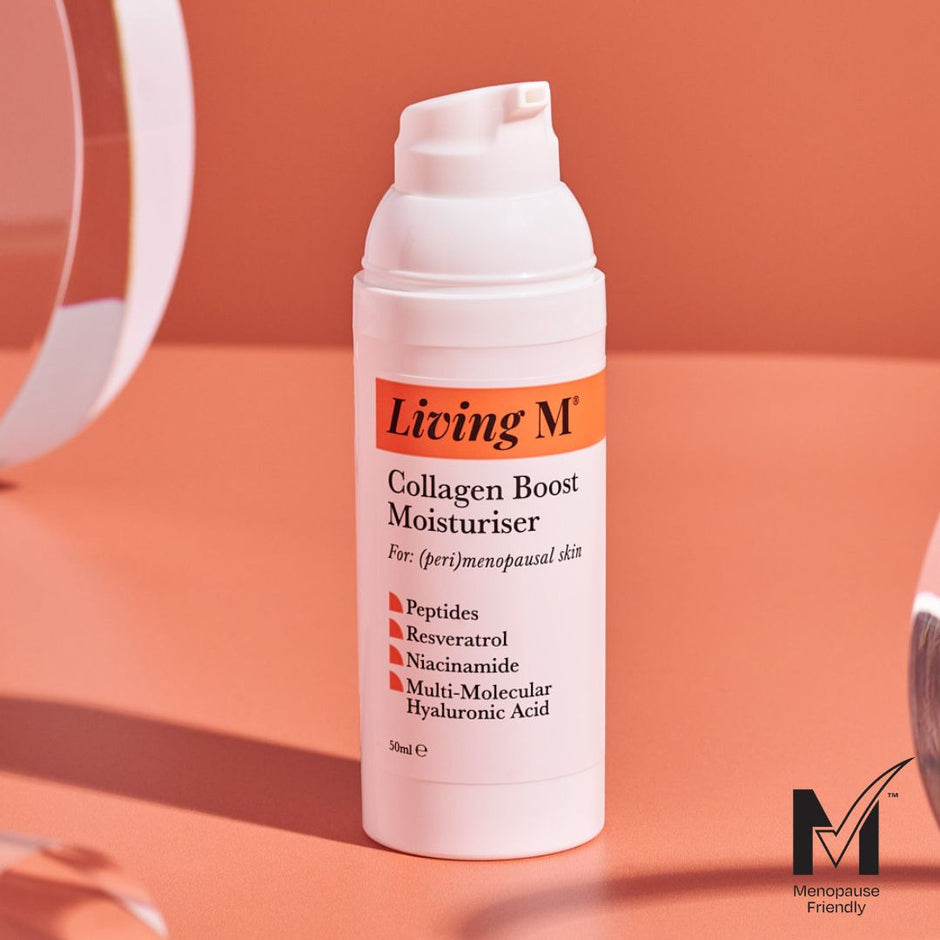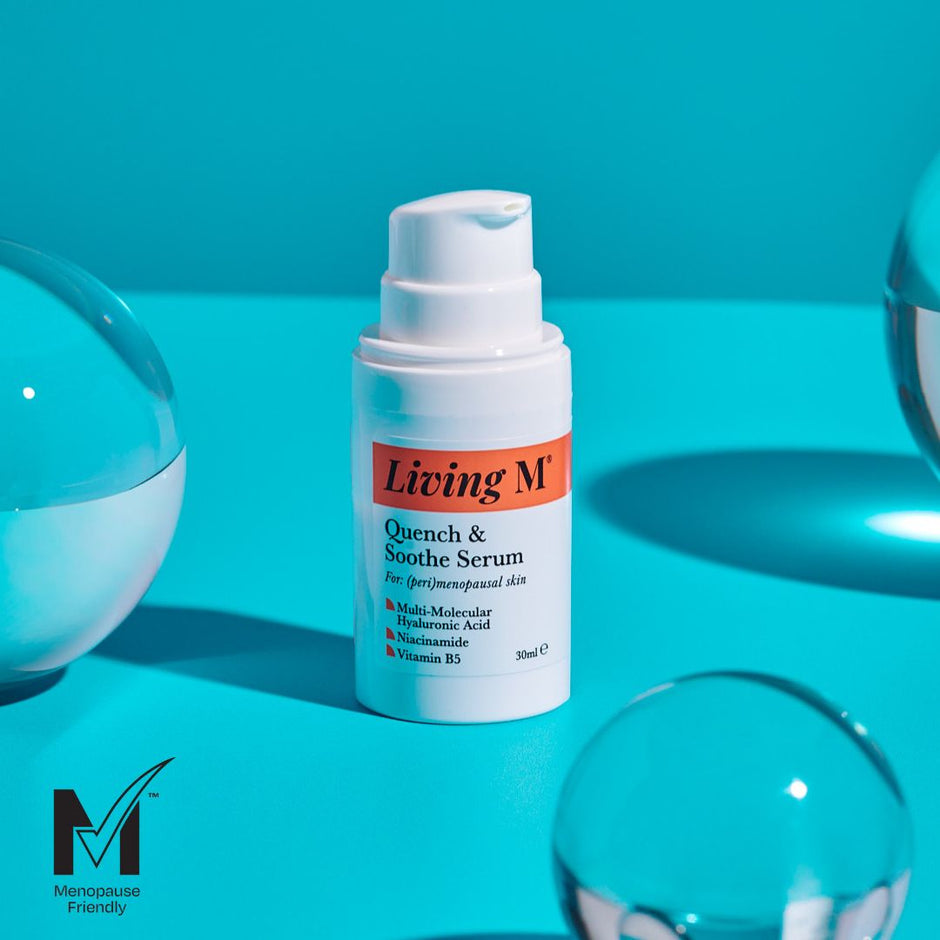You will probably be surprised to learn the hormonal changes we experience in menopause can affect the condition of our skin more than simply ageing can. We frequently talk about hormonal skin changes in relation to pregnancy and in puberty, but not the menopause.
Menopause is a hormonal rollercoaster, to put it mildly, and the effect on our skin can be dramatic. These hormonal changes can cause disruption to our skin’s structure, and it can often seem as if our skin has changed overnight.
Three key hormones are affected by menopause - oestrogen, progesterone, and testosterone. Declining levels of oestrogen generally has the greatest effect on the condition and health of our skin. Here are 5 key ways low oestrogen affects our skin in menopause and what we can do to reverse its effects.
What is Oestrogen?
Oestrogen is produced in the ovaries and is one of the female sex hormones. It begins to rise in puberty, fluctuates during your menstrual cycle but remains at a near constant level until menopause when levels start to fluctuate and ultimately decline. Oestrogen affects the structure of the skin it is responsible for the production of collagen, elastin, natural oils, and hyaluronic acid - all essential for healthy, great-looking skin. When oestrogen levels start to decline, the effect on skin is significant.
- Low oestrogen affects collagen levels in skin. Collagen is the structural protein responsible for skin’s elasticity – 30% will be lost in the first 5 years of menopause. As collagen production depletes in menopause, skin becomes drier, duller, and thinner. Cell turnover starts to slow rapidly, and skin is visibly less plump and radiant.
- Low oestrogen weakens your skin barrier. Low oestrogen causes skin’s natural protective barrier to weaken and vital moisture to be lost. External stressors are able to penetrate the skin, causing irritation and redness. Lacking in natural moisturisers, menopausal skin becomes more sensitive, reactive, and prone to irritation. A weakened skin barrier can make common menopausal skin symptoms like dryness and dullness even worse.
- Low oestrogen affects moisture levels in skin. Depleted levels of oestrogen also cause hyaluronic acid levels in the body to decline. Despite the acid in the name, it’s not an exfoliant. It’s a sugar molecule produced naturally in the body that can hold up to 1000 x it’s weight in water to keep skin cells hydrated and plump. It functions like a sponge in the body and binds water to the skin which is why it is known as “the moisture magnet”. When hyaluronic acid levels in the body decline, skin becomes parched and dehydrated losing that dewy look.
- Low oestrogen affects skin firmness and elasticity. Elastin production is also regulated by oestrogen and is impacted by depleted levels in menopause. Another critical skin protein, it provides elasticity and strength to skin, so when elastin levels decline skin starts to lose its plumpness and firmness and can start to sag.
- Cellular renewal starts to slow down. As oestrogen levels decline in menopause, skin’s turnover rate slows down leading to more fragile and transparent skin. Skin starts to lose its glow and plumpness as skin cells are renewed at a slower rate.
What Can help combat the effect of declining oestrogen on skin
As these skin changes start to take effect in menopause, women find that the products they have used before stop working or, worse still, start to irritate skin. To combat the effect of low oestrogen on your skin, you need a more targeted approach with well-formulated products with the right ingredients to tackle hormonal skin changes.
Boost Collagen Levels with the right skincare
You need to combat the effect of declining oestrogen by protecting and boosting collagen levels in your skin. Look for ingredients that can actively stimulate collagen production. Peptides are an intelligent skincare ingredient that send messages to your skin to produce more collagen. Use a great antioxidant that will give protection to your skin and restore that much needed glow and luminosity. Living M Collagen Boost Moisturiser is a multi-benefit moisturiser formulated with signal peptides, nourishing natural butters and resveratrol. Found in the skin of red grapes, resveratrol is a super effective antioxidant that also acts as a phytoestrogen to mimic the effects of oestrogen on the skin. Use daily and nightly for plumper, glowing, firmer skin.
Replace lost hydration
You need a serious hydration boost to replace lost water from the skin’s surface. Use super-hydrators like hyaluronic acid and glycerin which act as humectants and draw water into the skin. Living M Quench & Soothe Serum is formulated with three different types of hyaluronic acid and glycerin for an intense hydration boost.
Nourish to relieve skin dryness
You need nature’s super-moisturisers to relive the type of extreme skin dryness caused by menopause. Our Collagen Boost Moisturiser is blended with super nourishing natural butters avocado and cupuaçu to replenish lost moisture at a deeper level.
Get Your Glow Back with Niacinamide
Loss of radiance and glow is one of the biggest skin complaints we hear from our customers. Look no further than Niacinamide. It has so many benefits for menopausal skin it’s hard to know where to begin (read our Menopause and Niacinamide blog for all of them) but boosting radiance without causing irritation is a big one. Niacinamide has a super effective brightening effect on skin but unlike other radiance boosting ingredients, like Vitamin C, it is well tolerated and won’t cause irritation, redness, or sensitivity. Niacinamide also helps strength skin’s natural barrier. Living Skincare is all formulated with niacinamide as a base ingredient.
Incorporate a Retinol to increase cellular renewal
Heralded for its transformative effects on skin, retinol is universally acknowledged to be the gold standard skincare ingredient for ageing well. It’s ability to tackles the effects of reduced oestrogen is endless – reduction in fine lines and wrinkles (we prefer to call them laughter lines), it speeds up skin cell renewal, reduces hyperpigmentation, gently resurfaces skin, unclogs pores and boosts collagen production.
In menopause a well formulated retinol is a must but you need to be using the right formula. Super A Retinol Sleep Cream has been formulated especially for menopausal skin to enjoy all the benefits of retinol whilst minimising the risk of skin irritation.
Avoid Irritating Ingredients and simplify your skincare routine
Because your skin is more prone to sensitivity and dryness as you approach menopause, it’s important to avoid anything that is likely to irritate skin. Living M skincare has been formulated without any ingredients that are known to irritate skin such fragrance, essential oils, drying alcohols, and sulphates. These ingredients are in many skincare products, but they are best avoided in menopause or for anyone with any kind of skin sensitivity.
It can be really tempting to try all the latest products and layer lots of different ingredients, adding more steps in your skincare regime, but this can overload your skin and cause more problems than it solves. In menopause, your skin becomes much weaker and prone to sensitivity, so simplifying your routine is a must. Scale it right back to avoid irritation and focus on multi-benefit products that will give your skin everything it needs.
Our simplified menopausal skincare routine for maximum results - The Menopause Skin Solution Set targets the signs of oestrogen and collagen loss and repairs skin’s natural barrier
Step 1 QUENCH & SOOTHE SERUM is perfect for barrier repair with a supercharged dose of hydration formulated with hyaluronic acid, glycerin, niacinamide and vitamin B5.
Step 2 COLLAGEN BOOST MOISTURISER deeply moisturises and relieves skin dryness with a super nourishing blend of peptides, antioxidants, natural butters and hyaluronic acid
Step 2 SUPER A RETINOL SLEEP CREAM stimulates cell turnover and replenishes skin’s natural barrier with a blend of time release retinol, ceramides and hyaluronic acid.




